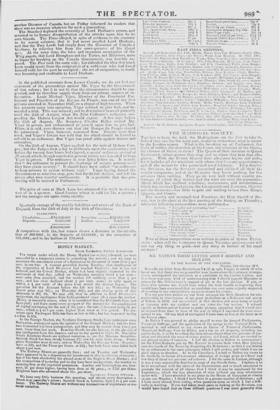In the published accounts from Lower Canada, we do not
find any -statement of the proceedings against Mr. Vigor by the Government of that colony ; but it is not fit that the circumstances should be sup- pressed, and we therefore supply them from our private sources of in- formation. Louis Michael Viger, Member of the Plovincial Par- liament and President of the Barque du Peuple, was one of the first persons arrested in November 1837, on a charge of high treason. When the amnesty came into operation, Viger refused to give bail, and de- manded a trial. This was refused ; and he determined to await patiently until the 23th of August, when Sir John Colborne's ordinance sus- pending the Habeas Corpus Act would expire. A few days before the t2:ith of August, Mr. Secretary Charles Buller visited Mr. Viger in prison, and endeavoured to preveil upon him to give bail. Hints, it is said, were thrown out that the Banque du Peuple should be patronized. Viger, however, remained firm. Threats Wcre then tried, and Viger's lawyer was told that his client should be forced to submit to an ordinance. But Viger was proof alike against threats and entreaties.
On the 9.5th of August, Viger applied for the writ of Habeas Cor- pus; but the Judges took a day to deliberate upon the application ; and before the tweoty, four hours had elapsed, a siwciul ordinance a, rived at ilknireal, which, though couched in genei al terms, was ktemlcd to keep Viger in prison. The ordinance is now lying before us. It is enti- tled " An ordinance to prevent the discharge of certain persons until they have given security." It should have been called "an otdinance to keep persons in prison without alai." Viger having forced the
• Government to take this step, gave bail for 20,000 dollars, and left his prison after nine months' confinement. It is probable that this pro- • needing will be noticed in Parliament.


























 Previous page
Previous page